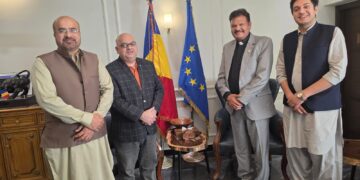Karachi, December 13, 2022: Shamim Ahmad’s third book “The Equitable Tax” with the subtitle “Paying income Tax is in the interest of all of us” was launched recently in Karachi. Besides the author, who retired as Chairman FBR, the speakers were: Dr. Ishrat Hussain, former Governor State Bank of Pakistan, Mr. Javed Jabber, former federal Minister and Ms. ShahbanoAlvi, the publisher.
The author, at the outset, elaborated his reason for writing a book on his former profession. His reason was that he was appalled by the dismal situation of tax collection in Pakistan, being 9.5% of the GDP. As a result of this pathetically low collection of tax, we always relied on borrowing, both domestic and foreign, and aid. He suggested the ways with which the tax collection could be enhanced. He vehemently opposed the non-taxability of income from agriculture which gaves rise to income from dubious sources masquerading as agriculture income.
Ms. Alvi lamented the poor condition of our economy which is being run on the crutches of borrowings and aid. Every now and then, we find ourselves close to the possibility of defaulting our obligations that make us seek the help of I.M.F. Whenever I.M.F. acquiesce to grant us loan, it does it with stringent conditionalities, which can and often does retard our country’s economic growth. Mr. Javed Jabber primarily referred to the repercussions of inequality arising out of the abyss existing between the haves and the have-nots which has reduced the latter powerless in nearly all fields of the national life. They and their successive generations are condemned to remain poor. They cannottake part in the democratic process and neither can get necessary health services. All this deprivation can lead them to criminal acts. He warned that if this situation is allowed to continue, it could lend to a bloody Red Revolution.
Dr. Ishrat Hussain emphasized the need of expanding the tax base, and deplored the present state of tax collection in Pakistan. He agreed with the basic idea of the book that we should rely more on direct taxation. He pointed out one highly regrettable aspect of our economy which is low savings. We have one of the lowest rate of savings in the world. Unless we save a substantial portion of our national income, we cannot reinvest and cannot grow economically. He also emphasized the importance of devolving powers to the local government.
The function was ably conducted by Ms. TayebaAhed as the M.C.




















